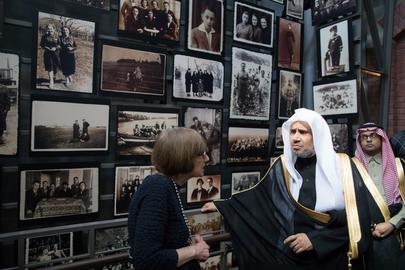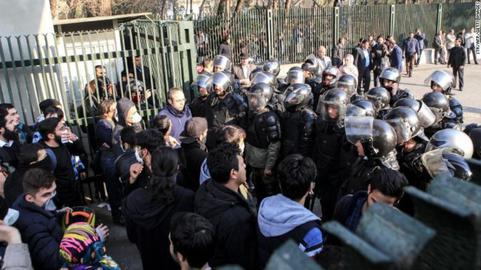As with every International Holocaust Remembrance Day, January 27, 2018 was marked by statements from top officials, leaders, politicians, and high-profile figures from around the world, who expressed their sympathy for and paid tribute to the victims of the genocide, and reiterated their commitment to ensuring nothing similar ever happens again.
Mandated by a UN resolution, the day marks the anniversary of the liberation of the Auschwitz death camp by the Soviet Red Army.
But this year one statement came as surprise to many people, leading them to stop and reflect. Dr Mohammad Al Issa, a top Saudi official and Secretary General of the Muslim World League (MWL), wrote an open letter to Sara Bloomfield, director of the US Holocaust Memorial Museum (USHMM), declaring his “great sympathy with the victims of the Holocaust” and condemning its denial in the strongest terms. In response, Bloomfield then invited Al Issa to visit the museum. And so history was made this week on May 3, when Al Issa made his visit.
“We are very grateful he accepted our invitation,” Tad Stahnke, the museum’s director for international education outreach, told IranWire in an interview.
Al Issa spent several hours touring the museum with Bloomfield and complimented it “on its efforts to document the historical evidence of Nazi crimes against Jews,” Stahnke told IranWire. The Saudi Muslim scholar wrote in the guestbook that the Holocaust “added to human history unforgettable horrifying images and a mark of shame.... Those who insist on denying or lessening this crime — after they are aware of its evidence — distort history and misguide others."
Until not long ago, “those” people included the highest Saudi officials, inducing the very founder of MWL, then crown prince Faisal. In 1962, at the height of the Arab Cold War, Faisal founded the Mecca-based NGO to mobilize the Muslim masses of the Middle East and beyond against the waves of pan-Arab socialism that were rocking the absolute kingdoms of the peninsula. Upon ascending to the throne in 1964, King Faisal heightened the use of MWL — and anti-Semitism was its mobilizing weapon of choice. Not only did he celebrate the notorious anti-Semitic text the Protocols of the Elders of Zion as historical fact, in the early 1970s, he regularly presented copies of a Pakistani edition of the pamphlet to state visitors. MWL promoted a virulent form of Islamism and, as recently as 2017, a prominent British institution condemned it as a linchpin for the promotion of extremism in the country.
The Saudi state also practiced Holocaust denial within its highest echelons. In 1976, its celebrated ambassador to the United Nations, Jamil Baroody, denounced the world-loved diary of Holocaust victim Anne Frank as a forgery and claimed that the Holocaust had never happened. As a mark of how times have changed, it is worth remembering that when Baroody passed away in New York’s Lenox Hill Hospital in 1979, then UN Secretary General Kurt Waldheim wrote to Saudi King Khalid praising Baroody as a UN “landmark” and one of the world body’s “oldest and best-loved friends.” Waldheim himself had risen to the top job at the UN despite having been a member of a division of the Nazi Party, a member of the SA and having served as a Wehrmacht intelligence officer in Thessaloniki, stationed only a few kilometers away from where one third of the city’s population — ie its Jews — were sent to Auschwtiz.
Al Issa had been initially introduced to the museum by Robert Satloff, the executive director of the Washington Institute For Near East Policy and the author of a book on the Holocaust’s reach into the Arab World. Back in December 2017, Satloff led a delegation of think tanks to Riyadh on a three-day visit, where he met Al Issa and was touched by his memories of visiting a synagogue in Paris.
Iran and Holocaust Denial
Stahnke believes Al Issa’s visit to the museum “sends a message to the world” — that the Holocaust “is an event whose horrors could not be denied or underrated by any fair-minded or peace-loving person,” as Al Issa wrote in his January letter to the director of the museum. This message is spreading throughout the Middle East, as some examples that follow will show. However, Stahnke points out one major Middle Eastern figure who still “regularly denies or questions the existence of Holocaust:” Iran’s Supreme Leader, Ayatollah Ali Khamenei.
The museum and IranWire co-produced a film on the Holocaust and its denial in Iran. Stahnke says this is part of the museum’s “robust partnership” with IranWire and its director Maziar Bahari “to develop films about the Holocaust for an Iranian audience.” He also highlights their forthcoming documentary film 82 Names, which tells “the story of a Syrian jailed and tortured by the Assad regime who brought documentation of secret detention in Syria.” The film is currently being shown and displayed in the museum.
Iran’s Islamic Republic has probably done more to promote Holocaust denial than any other state in the world today. This was especially so under the hardliner president Mahmoud Ahmadinejad, who dedicated considerable resources to the cause, inviting the world’s top Holocaust deniers to Tehran for a notorious confab in December 2006. The invitees included white nationalist and former KKK leader David Duke; the Moroccan-Swedish writer Ahmed Rami (who took part in the Moroccan coup of 1972 because he believed King Hassan II was a secret Jewish puppet) and Australian-British former beauty queen Michèle Renouf, who is known for her defense of top Holocaust deniers including Ernst Zundel and David Irving, and who has described Judaism as a “repugnant and hateful religion.”
After the pro-reform Hassan Rouhani was elected to the presidency in 2013, his foreign minister Javad Zarif promised things would change. When political strategist Christine Pelosi, the daughter of former Speaker of the House Nancy Pelosi, challenged Zarif on Iran’s Holocaust denial report, the foreign minister wrote back: “Iran never denied it. The man who did is now gone,” before wishing Pelosi a Happy Jewish New Year. But Iran’s top leader Ayatollah Khamenei has been consistent in his denials, as IranWire has repeatedly reported.
Prior to the conference, the Iranian newspaper Hamshahri, owned by the Tehran municipality and controlled by acolytes of Ahmadinejad (who had been the capital city’s mayor prior to being president), organized an International Holocaust Cartoon Contest. The event came in the wake of the controversy fueled by the Danish newspaper Jyallnds-Posten's publication of cartoons that mocked Islam’s Prophet Mohammad in September 2005. Presenting itself as a legitimate contribution the debate on freedom of speech, the Tehran contest claimed to highlight “Western hypocrisy” on freedom of speech by encouraging that the “taboo" on denying the Holocaust be broken down. The top prize was a staggering $12,000, which went to the Moroccan cartoonist Derkaoui Abdullah, and thousands more were handed out to other winners, including the well-known Brazilian cartoonist Carlos Latuff, who won second prize. The cartoons included those that questioned “the myth of the gas chambers” (by the French A-chard) and claimed that the Holocaust had barely caused any deaths compared to the Israeli-Palestinian conflict (by Naji Benaji of Morocco).
Furthermore, in January 2015, when the world was still reeling from the shock of an ISIS attack on the Paris offices of the satirical magazine Charlie Hebdo, which killed 12 people, many of them the magazine’s cartoonists, the Iranian House of Cartoon and the Sarcheshmeh Cultural Complex announced the launch of the second International Holocaust Cartoon Contest. Charlie Hebdo’s defiant publication of new cartoons of Mohammad was the alleged motivation behind the Tehran contest, which was exhibited in the headquarters of the Islamic Development Organization on May 13, 2016. (The organization, a shadowy, multi-million-dollar behemoth controlled by the Supreme Leader’s appointees, is known as the “Islamic Propagation Organization” in Persian). Zarif tried to distance the Rouhani administration from the event, but close scrutiny revealed that officials of Iran’s Ministry of Culture and Islamic Guidance were indeed involved, a fact that put the cultural exchange program between Tehran’s Museum of Contemporary Arts and its European counterparts on pause.
Ahmadinejad’s policy of fervent Holocaust denial continues to have its fans. Just a few days ago, on May 1, London-based commentator Ali Alizadeh praised Ahmadinejad’s foreign policy and compared it favorably with that of Rouhani. Iran was now forced to be defensive in its public rhetoric, Alizadeh said, “compared with the Ahmadinejad era, when the top question had become whether the Holocaust had happened or not.”
Change Across the Middle East
But across the Middle East, the situation is looking better, and the Washington DC-based museum is doing its part.
The same UN resolution that established January 27 as Holocaust Remembrance Day calls on countries to “develop educational programs to instill the memory of the tragedy in future generations to prevent genocide from occurring again." The US museum is working closely with partners around the world, including in the Middle East and North Africa, to bring that about.
In Tunisia, the only functioning democracy in the region, civil society led a Holocaust Remembrance Day ceremony this year. Historian Habib Kazdaghli is introducing the museum’s traveling exhibition — which examines how the Nazis used propaganda to come to power and drive Germany to genocide — to a group of Tunisian students and educators.
In Morocco, King Mohammad’s brother has endorsed Holocaust education and, according to Stahnke, the USHMM is about to sign an agreement with the country’s National Archives “to exchange archive material about the situation of Jews in North Africa during the Second World War, with an eye toward further additional activities.”
But challenges remain, and Stahnke decries the fact that even “the very existence” of Holocaust education programs can become “politicized.” In the Middle East, this politicization is always linked to Israel. Palestinian Authority President Mahmoud Abbas recently shocked the world by blaming Jewish “social behavior” in Europe for the Holocaust, before being forced to apologize on May 4, saying that he rejects anti-Semitism “in all its forms” and calling the Holocaust the “most heinous crime in history.”
“Holocaust denial by senior Iranian leaders accompanies genocidal rhetoric against Israel,” Stahnke says. “At the same time, these and other leaders do not permit education about the Holocaust in schools and universities, which withholds from millions of people the opportunity to learn important lessons from history.”
But the Holocaust education work of USHMM has never been limited to history. It has actively worked to stand up to the threat of genocide, wherever it raises its head. That’s why it recently issued a report on the plight of Rohingya Muslims in Myanmar and it took the drastic step of revoking its Elie Wiesel Award from Aung San Suu Kyi, Myanmar’s de facto leader, for what Stahnke calls “her failure to take action to stop the persecution of Rohingya.”
The road to full recognition of historical crimes is long. But, as the historic visit of Al Issa shows, turnarounds can come from unexpected corners.
Watch Crime and Denial, a film co-produced by IranWire and the United States Holocaust Memorial Museum that aims to educate Iranians and others about the Holocaust
visit the accountability section
In this section of Iran Wire, you can contact the officials and launch your campaign for various problems

























comments